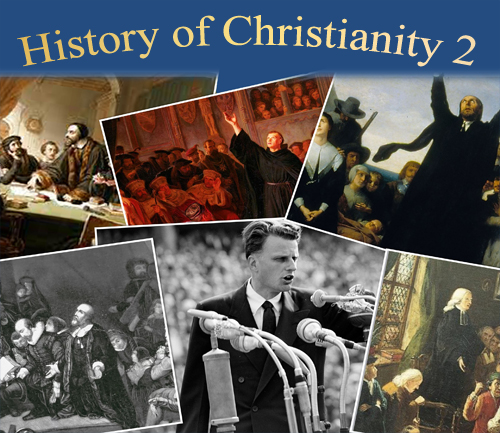Module 12: Evangelicals
Hi everyone, and welcome back to the twelfth module of the History of Christianity 2 Course. In this section, we'll be working through some similar movements in the English speaking church that came out of the Modernist/Fundamentalist divide. This module will cover the various aspects of the Evangelical and Later Fundamentalists movements.
This module will help you to understand the history, theology, and practices of these various movements, how they were different and slowly divided from the same beginning, and their influence on the worldwide church as a whole. The student will be able to consider the different approaches and practices of the various subgroups among this larger topic.
The student will have opportunity to evaluate all these various movements, principles, approaches, practices, and their underlying theologies, as well as the lessons that can be learned from these various Evangelicals and Fundamentalist movements. This module will also aid the student to work through how the lessons learned are applicable in their own life and ministry.
Introductory Scenario
Imagine someone told you that you had to choose between eating and breathing, and you could never do the other one ever again. You would likely tell that person to go jump in a lake (or something less polite). That is obviously a false dilemma and unnecessary choice. However, there are many similar false choices that are not always so obvious. How can we recognize such deceptive manipulation and such attempts steering us to choose to give up one good thing for the sake of another good thing? How can we tell when we truly have to prioritize one over the other? How can we know when we need to keep both good choices? What authority should we use? And how can we protect ourselves from being manipulated or deceived into making a false choice? Please consider these questions and be watching for material that will help you answer them as you work through this module.
Module Objectives and Outcomes
Upon successful completion of this module, the student will:
- Understand the history of the Evangelicals and why they eventually were distinguished from the Fundamentalists.
- Describe the major characteristics, beliefs, and practices of Evangelicals, and how these were demonstrated in some of their early leaders.
- Evaluate the mindset and practices of the Evangelicals and Fundamentalists, and learn and apply those principles to aid in current life and ministry.
- Place the major events and people of these movements in a general chronology.
Instruction Guides
In this section, you'll find links to important instructional documents for this module. Click the following links to open each document. There is a set of instructions for individual study and a document for group study.
Textbook Content
In this section, you'll find a study guide for the textbook reading for module 12. And then you'll find the link to a practice quiz covering this textbook reading.
This section also contains a review quiz to test your understanding of the textbook material for this module. By clicking the banner below, you will be given a series of questions, in random order. The quiz will be different each time, so feel free to take it more than once.

Click the button next to the best answer for each question, or drag each term to its best definition. Then press the Submit
button at the bottom to see if your answers are correct.
Lecture Content
In this section, you will find the video lectures for the Evangelicals & Later Fundamentalists module. They are designed to be watched in order, but each video should make sense on its own. Click each banner to open access to each video. There are also links with each video if you prefer to watch on the Rumble or YouTube interface or download just the audio to listen offline.































